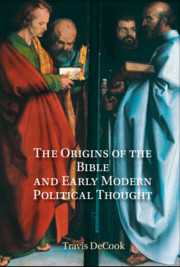 The Origins of the Bible and Early Modern Political Thought
The Origins of the Bible and Early Modern Political Thought Eternal Word, Historical Artifact – Biblical Transcendence and Immanence in the Wake of Humanism and Reformation
Published online by Cambridge University Press: 02 March 2021
The Introduction lays out the book’s main argument about the uses to which accounts of the Bible’s origins were put in the sixteenth and seventeenth centuries. It sketches the historical context for this phenomenon, discussing how the period was characterized by heightened attention on the Bible’s ultimate divine origin, transcendent of all historical contexts, and at the same time by a new focus on the human and historical mediations shaping Scripture’s extant forms. The Introduction proceeds to a critical analysis of how modern scholars have understood these modes of biblical reception according to theories of secularization and modernity, with some arguing that the early modern Bible’s transcendence, and some its immanence, played important roles in the development of secularity, disenchantment, and modernity. Through engaging this scholarship, the Introduction develops arguments that challenge contemporary thinking about secularity. Following a discussion of the scholarly field of political theology and the present book’s relationship to it, the Introduction ends with an overview of the book's chapters.
To save this book to your Kindle, first ensure no-reply@cambridge.org is added to your Approved Personal Document E-mail List under your Personal Document Settings on the Manage Your Content and Devices page of your Amazon account. Then enter the ‘name’ part of your Kindle email address below. Find out more about saving to your Kindle.
Note you can select to save to either the @free.kindle.com or @kindle.com variations. ‘@free.kindle.com’ emails are free but can only be saved to your device when it is connected to wi-fi. ‘@kindle.com’ emails can be delivered even when you are not connected to wi-fi, but note that service fees apply.
Find out more about the Kindle Personal Document Service.
To save content items to your account, please confirm that you agree to abide by our usage policies. If this is the first time you use this feature, you will be asked to authorise Cambridge Core to connect with your account. Find out more about saving content to Dropbox.
To save content items to your account, please confirm that you agree to abide by our usage policies. If this is the first time you use this feature, you will be asked to authorise Cambridge Core to connect with your account. Find out more about saving content to Google Drive.